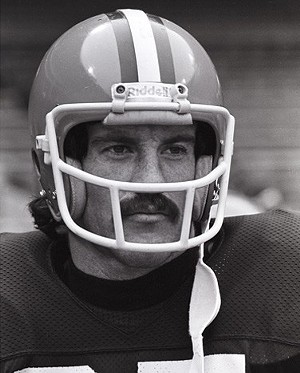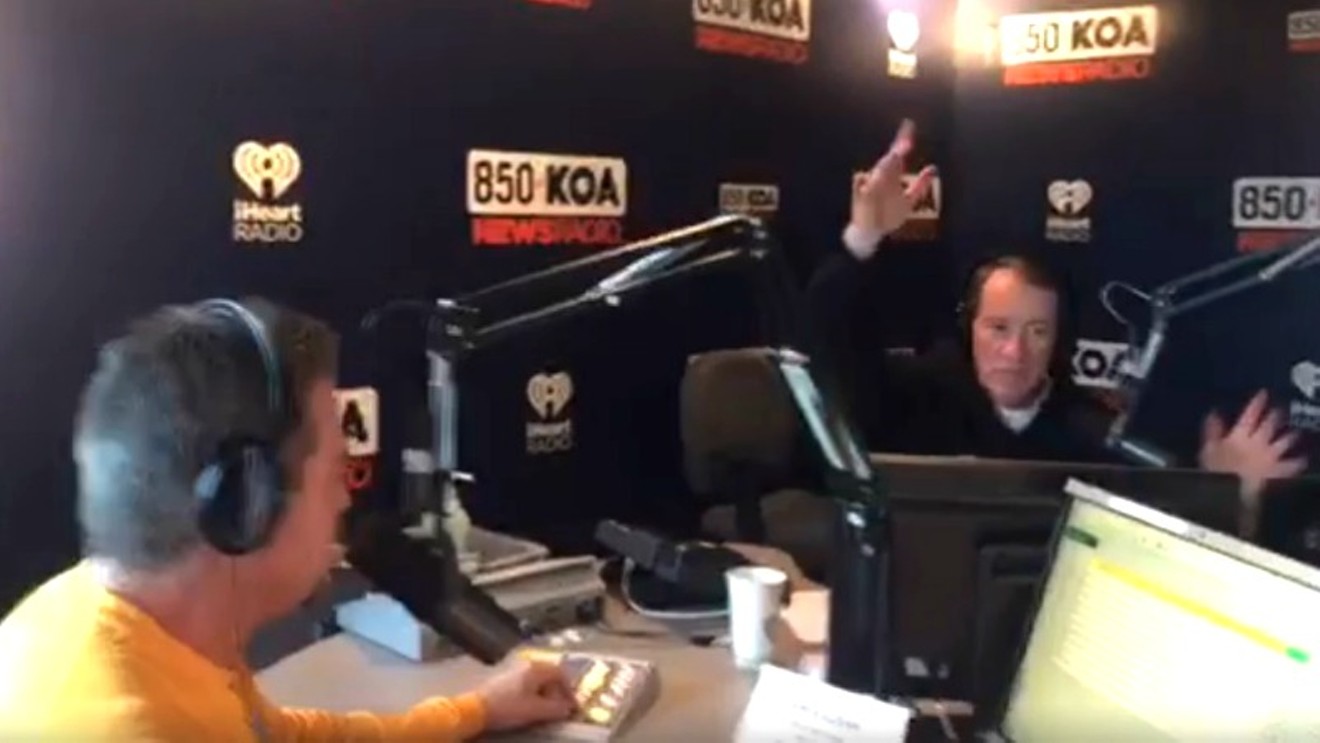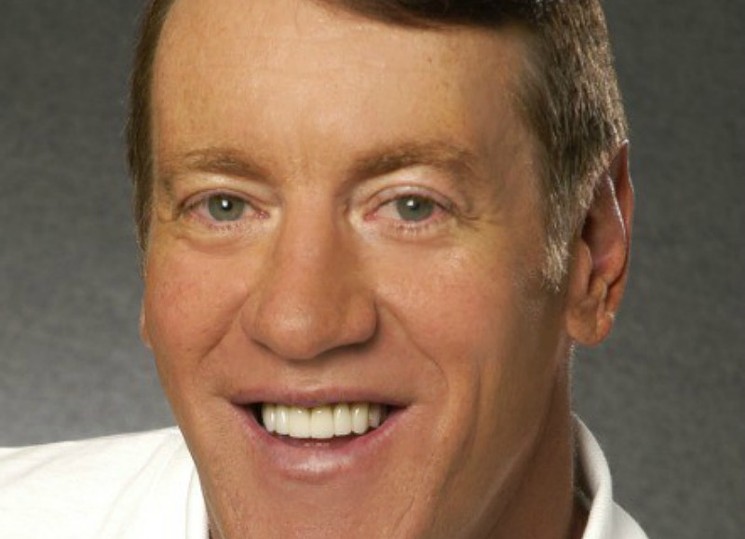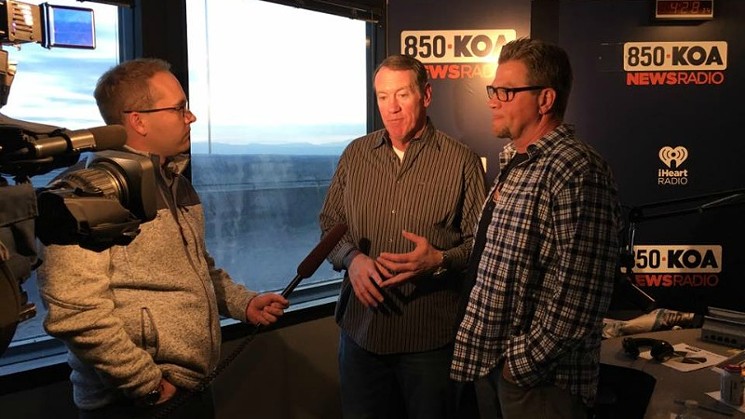But after a little more than a week behind the microphone for the afternoon-drive show, Logan says the combination of him and Lewis (supplemented by Kathy Lee, Lewis's Fox morning-show sidekick), already feels more natural to him than many of his listeners might have believed possible.
Shortly after the publication of yesterday's interview with Lewis about the new program (and his beyond-crazy schedule of two major shows every weekday), Logan took part in a wide-ranging interview about his new adventure.
Topics include his varied broadcasting career, his devotion to coaching high-school football (he's currently overseeing the Cherry Creek High squad) and how that will fit into his new gig, and his confidence that KOA listeners caught off-guard by the sometimes wild nature of the program will soon feel right at home.
Westword: When was this idea first presented to you? And how was it presented to you?
Dave Logan: Tim Hager called and wanted me to stop in one morning before the show that I was doing [on Denver Sports 760, a KOA sister station]. He asked me what I thought of Rick, which was kind of a funny question, and honestly, it wasn't really on my radar at that point — so I said, "Rick who?" And he said, "Rick Lewis." I said, "Oh, we're good." I've been on his show a few times, and even though I didn't know him that well, we've been friendly for a long time. And he said, "What would you think of doing a show with him?"
Initially, honestly, I thought he was talking about the morning show. I said, "I'm not really a 4 a.m. guy with my schedule. So I'm good with what I'm doing." And he said, "No, I'm talking about the afternoons." And that was the genesis of the move. From that point, things just started to fall into place, when he realized both of us were willing to do it and would be excited about it.
A lot of people who think of you as the voice of the Broncos probably don't realize how many different kinds of radio shows, and radio styles, you've worked in over the years. [Logan laughs.] Could you touch on some of the different programs and formats you've handled over the years?

In 2009, Logan was named to Parade magazine's top fifty All-America high school football players of all-time.
File photo
I was doing the Nuggets TV package at the time with Al Albert, and Scott was the sideline reporter. He had just retired from playing, and he was a really good guy; we had a good relationship. I said, "Listen, I'm happy to give it a go." So they said, "We've got this other station in the cluster, so we're going to put you on AM 760." But they also said, "We'd like you to stop coaching high-school football."I said, "No, I really don't want to do that. I'll just stay six-to-eight." Then, after we talked a while, they said, "Okay, we'll let you do it," and Scott and I did the show. We sat in a little, bitty studio, really small; I don't think they realized that we were a couple of pretty big guys. And we got really good ratings and we had a great rapport — he's great to work with. So then they said, "We're going to move you to KOA" in the afternoons.
We said, "Great," but then we got the same thing again about me having to stop coaching high-school football. And I said, "Nah, I really don't want to do that. So I'll stay on 760." But they said okay again, and Scott and I moved to KOA for a show that was initially called The Sports Zoo before they just called it The Zoo. It was sort of an ensemble cast. Susie Wargin was part of that; she was the sports chick. And Andy Lindahl was part of that. There were a lot of different players in that mix. And we did that for twelve years, doing the drive-time on KOA. It was a successful show, it was a funny show, it was a fun show to do.
Taking out the "sports" in the title made sense, because you touched on a lot of different subjects.
It was kind of a topic-of-the-day type of show — whatever topic that would interest people, whether it be sports or politics or entertainment. We always had sort of a humorous side to the show. Our thing, as we talked about it and planned the show, was that as people were driving home, we wanted them to be able to find a little humor. They can kick back and enjoy the show and it didn't have to be a serious show all the time.
After that show, what happened next?
Scott left the station, left the cluster. I think that was in ’05. And my next partner was Lois Melkonian. Lois had a really successful radio career in San Francisco. She was a morning host on a big station in San Francisco and had done news-formatted shows for a long time and done them very well, but she'd never done the talk format. She and I worked together from then until about 2011, and that was a different show. We had both had children, so we talked about kids, we talked about everything. But it was a different show from my perspective than doing the show with Scott. She then took a job in Houston — ironically, at a news-formatted station. Then I worked for a couple of years with Dave Krieger, who is brilliant. But that was a sort of a hardcore sports-talk show.
At that point, they wanted to change the format again, and David was gone — and they wanted to go back to more of a news format with me and Susie Wargin again. We did three-to-five, and then Mike Rice and Susan Witkin would do five-to-seven. They did a news-wheel type format that's very similar to the morning news. And we did that for a year and then they decided they'd just have Mike and Susan do the afternoon show in its entirety and Susie and I would move to 760. So for the past year, Susie and I did a show from 10 a.m. to noon on 760. We had a great time. We had good guests on; we had Charles Barkley on the last week we were on. It was really a fun show to do.
760 is a more prominent station than it was the first time you had a show there, but it's still not the Blowtorch [the nickname for KOA because of its 50,000-watt power rating]. Was that part of the thinking behind you moving back to KOA — that they wanted someone with your experience and name recognition to be on the big station?
I don't know. But when the topic was broached with me in, probably, late October, I was pretty surprised by it. I didn't think the afternoon show, given the fact that I'd have to miss a lot of time in the fall coaching high-school football, would be a reasonable expectation from the company's standpoint. I had kind of moved on from that, assuming that their position was going to remain consistent. But they were willing to work with my schedule. That was talked about before the move was made, and it was made clear to me that the company has changed its position on that, which is great news for me.
None of the three players who moved to the afternoon went to them and said, "Hey, we've got a great idea. What do you think about this?" It was them coming to us and saying, "We've got this idea. We want to put this in play." And also, Rick is a longtime radio guy with great radio chops, and he's been used to running the show. So in terms of the fall, that's good news for me, because the show will carry on. I'll be on the show sometimes, but I'll still be fulfilling all of my coaching obligations.
[Here's a video of Lewis and Logan in action.]
Stylistically, the show represents a direction that people may not associate with you. Is it something that feels natural — to maybe be a little looser, a little more ribald at times? Or is it an adjustment?
In all honesty, it hasn't been an adjustment at all for me. I like doing smart, quick-witted radio, and it's similar in one respect to what I did with Scott for twelve years. It's similar in that it's a bit unconventional and it can be edgy, and sometimes we can touch on topics that may make some people uncomfortable — but that's okay. I've enjoyed the shows we've done so far. I think we'll find what grounds we're going to walk on and traction the show as we go on. But honestly, I don't have any doubt that the show is going to be really good and really entertaining, and I'm excited about it.
Rick has admitted that some of the old-school KOA listeners haven't fully come on board yet, given how different it is from what's been on the station before. Do you understand where they're coming from? And do you think they'll be more receptive after giving the show a longer sample?
I would say this: Anytime you change — and I mean any kind of change — it can make people uncomfortable. I think it's human nature to sort of push back on change, whether it be who you listen to on the radio or what newscast you watch at night. Once we get used to a certain routine, we don't necessarily like somebody forcing us out of a routine. So I get it. It's similar to what I remember people saying when Scott and I got together in the ’90s. It was something people weren't used to hearing on KOA. We had some pushback, but not a lot. And I think if people listen to the show and give it a chance, I think they will by and large enjoy it. But I understand the pushback, because it's different from what they're used to hearing on KOA.
For you, is it fun to work in a different style? Does it keep you fresh?
I think you could say that. I've certainly had that sort of feel with Susie. She has that ability to branch out and do different-type shows. But I look at this as the next chapter. I'm excited about it, because if you're not careful, you can get typecast in a role and get bored in a role if it never changes — if you don't have new things to look forward to.
This isn't going to be the kind of show where I'll sit back and go, "Wow, what are we doing?" I did a show similar to this, but it was ten-plus years ago. So people haven't really heard me in this particular position. I get it that people may be a little stunned — like, "What's going on here?" But I feel that people are going to like this and will listen. At least that's my hope.















